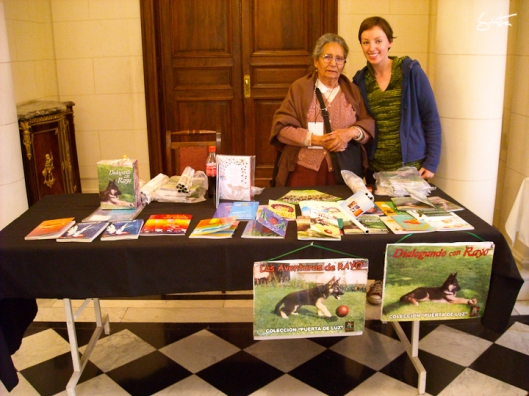W 1980 r. pierwsza kobieta – prezydent Boliwii, Lidia Gueiler Tejada, ustanowila 11 pazdziernika “Dniem Kobiety Boliwijskiej”, na czesc pisarki, poetki i nauczycielki – Adelii Zamudio Ribero, prekursorki edukacji i emancypacji kobiet.
Podobnie jak byla prezydent, Adela Zamudio (1854) urodzila sie w Cochabambie, w zamoznej rodzinie mieszczanskiej. Uczeszczala do publicznej szkoly podstawowej, pozniej zas byla nauczana przez rodzicow. W wieku 15 lat opublikowala swoj pierwszy wiersz ‘Rosa‘, ale jej pierwsza ksiazka zostala wydana dopiero 20 lat pozniej. Pisala pod pseudonimem ‘Soledad‘ (Samotnosc), ktory odzwierciedlal jej stosunek do konserwatywnego boliwijskiego spoleczenstwa, w ktorym czula sie niezrozumiala i osamotniona.
In 1980, the first female President of Bolivia – Lidia Gueiler Tejada, announced the October 11th as “The Day of Bolivian Woman”, in honor of the writer, poet and teacher – Adelia Zamudio Ribero, predecessor of education and emancipation of Bolivian women.
Similar to her famous female successor, Adela Zamudio (1854) was born in Cochabamba into upper-class family. She attended public elementary school, later being tutored by her parents. At the age of 15 she published her first poem ‘Rosa‘, but her first book wasn’t published until 20 years later. She wrote under the pseudonym of ‘Soledad‘ (Solitude), which reflected her attitude toward the conservative Bolivian society, by which she felt misunderstood.
W swojej poezji i fikcji, Zamudio skupila sie przede wszystkim na walce z nierownosciami spolecznymi, kreslac wizje romantycznej rewolucji. Jej styl pisania byl czysto intelektualny i swiecki, a jej artykuly pisane do gazet promowaly demokratyczne reformy, walke o prawa kobiet do glosowania, slub cywilny oraz legalizacje rozwodu, czyniac Adele Zamudio prekursorka emancypacji kobiet w Boliwii. Byla rowniez zagorzala przeciwniczka seksizmu, bigoterii i fanatyzmu religijnego, i jako dyrektorka (wczesniej zalozycielka) pierwszej szkoly sredniej dla dziewczat, zrezygnowala z nauczania lekcjii religii, zostajac publicznie potepiona przez Lige Kobiet Katolickich.
Silny charakter Adeli Zamudio oddaje jeden z jej wierszy, ‘Nacer Hombre‘ (Urodzic sie mezczyzna), w ktorym autorka nie przebiera w slowach, jasno dajac do zrozumienia co mysli o tradycyjnym podziale spoleczenstwa.
In her poetry and fiction, Zamudio focused on the fight against social inequalities, envisioning the romantic revolution. Her writing style was purely intellectual and secular and she wrote many articles for newspapers, promoting democratic reforms, women’s rights to vote, civil marriage and legalization of divorce, being the same precursor of Bolivian women’s emancipation movement. She was also a staunch opponent of sexism, bigotry and religious fanaticism and as a director (previously founder) of the first secondary school for girls in Cochabamba, she resigned from teaching religion, what resulted in her public damnation by the League of Catholic Women.
The strong character of Adela Zamudio can be clearly visible in one of her poems: ‘Nacer Hombre‘ (Born Man), in which the author does not mince her words, saying what she thinks about the traditional division within society.
Una mujer superior
en elecciones no vota,
y vota el pillo peor;
(permitidme que me asombre)
con sólo saber firmar
puede votar un idiota,
porque es hombre.Inteligentna kobieta nie glosuje w wyborach, a glosuje najwiekszy lotr. Wiedzac tylko jak sie podpisac, moze glosowac idiota, poniewaz jest mezczyzna.
Intelligent woman does not vote, but the worst scoundrel does. Knowing only how to sign, the idiot can vote, because he is a man.
*
Niemal wszystkie postulaty najslynniejszej pisarki boliwijskiej zostaly spelnione – kobiety otrzymaly prawo do glosowania i rozwodu. Ale niestety Boliwia w pewnym momencie zboczyla z drogi postepu i dzis, jak podaja ostatnie badania Swiatowej Organizacji Zdrowia, zajmuje ona wsrod 12 krajow regionu, niechlubne pierwsze miejsce w przemocy wobec kobiet, a drugie po Haiti, w przemocy seksualnej.
Almost all demands of the most famous Bolivian female writer have been met – women received the right to vote and right to divorce. But unfortunately Bolivia at some point has deviated from the path of progress and today, as a recent study of the World Health Organization shows, it takes an infamous first place among the 12 countries of the region, in violence against women, losing only to Haiti in sexual violence.
Dlaczego silnym i pewnym siebie kobietom boliwijskim, nastepczyniom dzielnych ‘Heroinas de Coronilla‘ nie udalo sie do dzis wyzwolic? Według raportu opublikowanego przez ONZ, w Boliwii mezczyzni otrzymuja lepsze wyksztalcenie niz kobiety oraz lepsza opieke medyczna. Uznaje sie, ze smiertelnosc matek i analfabetyzm wsrod kobiet boliwijskich sa jednymi z najwyzszych na swiecie. Kobiety w Boliwii zarabiaja o wiele mniej niz mezczyzni, czesto pracujac ciezej, szczegolnie jezeli wezmie sie pod uwage to, ze kobiety sa odpowiedziane za prace domowe i opieke nad dziecmi.
Czesc winy ponosi zapewne zakorzeniona w latynoamerykanskiej mentalnosci i powszechnie akceptowana postawa ‘macho‘, przejawiajaca sie wlasnie w instrumentalnym traktowaniu kobiet.
Why these strong and confident Bolivian women, successors of the brave ‘Heroinas de Coronilla‘ haven’t managed to emancipate until today? According to a report published by the United Nations, in Bolivia the men receive better education than women as well as better medical care. Mortality of mothers and illiteracy among women of Bolivia are also among the highest in the world. Men also earn more money, working less, especially if we take into an account the fact that women exclusively do housework and care for children.
The part of the blame probably is rooted in the Latin American mentality and generally accepted ‘machismo’, manifested in the instrumental treatment of women.
O przejawach i konsekwencjach ideologii ‘machismo’ szerzej w nastepnym wpisie / More about forms and consequences of this narrow-minded ideology in the next post.


